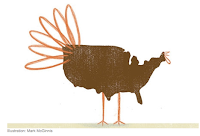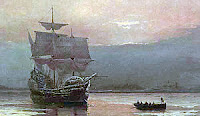
 Thanksgiving
is a traditional, and federal holiday celebrated in the United States on the
fourth Thursday of November. The National Proclamation of Thanksgiving was
first declared by the Continental Congress in 1777. The days of Thanksgiving
varied from year to year, but were celebrated with some regularity in the mid-17th
century after the harvest was in.
Thanksgiving
is a traditional, and federal holiday celebrated in the United States on the
fourth Thursday of November. The National Proclamation of Thanksgiving was
first declared by the Continental Congress in 1777. The days of Thanksgiving
varied from year to year, but were celebrated with some regularity in the mid-17th
century after the harvest was in.
 However,
it was in 1863, when President Lincoln proclaimed it a national holiday to be
celebrated the fourth Thursday of November each year that Thanksgiving began to
become a treasured holiday.
However,
it was in 1863, when President Lincoln proclaimed it a national holiday to be
celebrated the fourth Thursday of November each year that Thanksgiving began to
become a treasured holiday. 
 The
Pilgrims celebrated the first Thanksgiving in 1621 at what is now the Plymouth
Plantation. The three-day feast was held after the first successful harvest in
the New World. Over fifty Pilgrims
and 90 Wampanoag Indians attended the celebration.
The
Pilgrims celebrated the first Thanksgiving in 1621 at what is now the Plymouth
Plantation. The three-day feast was held after the first successful harvest in
the New World. Over fifty Pilgrims
and 90 Wampanoag Indians attended the celebration. The
foods of the first Thanksgiving varied somewhat from what we have today. The Pilgrims did have access to wild
turkeys, but there was also venison, eel, cod, bass, and waterfowl available.
The
foods of the first Thanksgiving varied somewhat from what we have today. The Pilgrims did have access to wild
turkeys, but there was also venison, eel, cod, bass, and waterfowl available. Vegetables
that were available included corn, onions, leeks, carrots, cabbage, various
squash and pumpkins; nuts, dried fruits, cranberries, and apples.
Vegetables
that were available included corn, onions, leeks, carrots, cabbage, various
squash and pumpkins; nuts, dried fruits, cranberries, and apples.  In
modern times, our Thanksgiving usually includes what has come to be known as traditional
foods; turkey, dressing/stuffing, mashed potatoes, sweet potatoes, gravy,
cranberry sauce, autumn vegetables such as sweet corn, beans, squash, and, of course,
pumpkin pie. The choice of beverage usually includes tea, coffee, colas, wine,
and beer.
In
modern times, our Thanksgiving usually includes what has come to be known as traditional
foods; turkey, dressing/stuffing, mashed potatoes, sweet potatoes, gravy,
cranberry sauce, autumn vegetables such as sweet corn, beans, squash, and, of course,
pumpkin pie. The choice of beverage usually includes tea, coffee, colas, wine,
and beer. But
has wine always been a Thanksgiving staple? According to information regarding what type of cargo the Mayflower
carried – wine was regularly included on its shipping roles. The ship's
hold could carry 180 oak casks of wine.
The Mayflower was typically loaded with wines from Bordeaux and La
Rochelle, France for the return trip to England.
But
has wine always been a Thanksgiving staple? According to information regarding what type of cargo the Mayflower
carried – wine was regularly included on its shipping roles. The ship's
hold could carry 180 oak casks of wine.
The Mayflower was typically loaded with wines from Bordeaux and La
Rochelle, France for the return trip to England.  Wine
was also listed in the supplies that were sent to the New World from England, along with
beer, aqua vita, (a drink made from distilled wine or beer,) and hard
cider. As the colonists learned
how to make these drinks in America, the beverages began to disappear from
the shipping supply roles.
Wine
was also listed in the supplies that were sent to the New World from England, along with
beer, aqua vita, (a drink made from distilled wine or beer,) and hard
cider. As the colonists learned
how to make these drinks in America, the beverages began to disappear from
the shipping supply roles.  While native grapes, fruits, and grains would have
changed the taste of the wines, beers, and hard ciders, colonists learned how
to work with them to craft flavorful beverages to enjoy with their meals. By the mid-1600’s, hard cider was the
drink of choice in the colonies.
While native grapes, fruits, and grains would have
changed the taste of the wines, beers, and hard ciders, colonists learned how
to work with them to craft flavorful beverages to enjoy with their meals. By the mid-1600’s, hard cider was the
drink of choice in the colonies. Today,
many wines are touted as excellent Thanksgiving wines – Pinot Noir,
Zinfandel, Sauvignon Blanc, Riesling, Gewurztraminer/Traminette, and sparkling wines like Moscato, just to name a few.
Today,
many wines are touted as excellent Thanksgiving wines – Pinot Noir,
Zinfandel, Sauvignon Blanc, Riesling, Gewurztraminer/Traminette, and sparkling wines like Moscato, just to name a few.
 Another pairing idea - Beaujolais. Georges
Duboeuf knew that this wine would go wonderfully well with the normal autumn
celebration fare, but Beaujolais was traditionally not released until December
15th. With that in mind, Duboeuf
released his Beaujolais on the third Thursday of November, and called it
Beaujolais Nouveau. Now the third Thursday of November is heralded by the
anticipated release of Beaujolais Nouveau, well ahead of the traditional
Beaujolais release date, and just in time for autumn celebrations.
Another pairing idea - Beaujolais. Georges
Duboeuf knew that this wine would go wonderfully well with the normal autumn
celebration fare, but Beaujolais was traditionally not released until December
15th. With that in mind, Duboeuf
released his Beaujolais on the third Thursday of November, and called it
Beaujolais Nouveau. Now the third Thursday of November is heralded by the
anticipated release of Beaujolais Nouveau, well ahead of the traditional
Beaujolais release date, and just in time for autumn celebrations.
 If
you’re feeling adventurous, or would like to add a bit of authentic autumn
flavor to your celebrations, consider a cranberry wine, or one crafted from
pumpkins, persimmons, or apples.
If
you’re feeling adventurous, or would like to add a bit of authentic autumn
flavor to your celebrations, consider a cranberry wine, or one crafted from
pumpkins, persimmons, or apples.  Regardless
of your choice of foods and wines for this Thanksgiving, remember to be thankful
that you have a wine glass, and grateful that there’s something in it! ;)
Regardless
of your choice of foods and wines for this Thanksgiving, remember to be thankful
that you have a wine glass, and grateful that there’s something in it! ;)
Happy
Thanksgiving, & Enjoy!
~
Joy









No comments:
Post a Comment